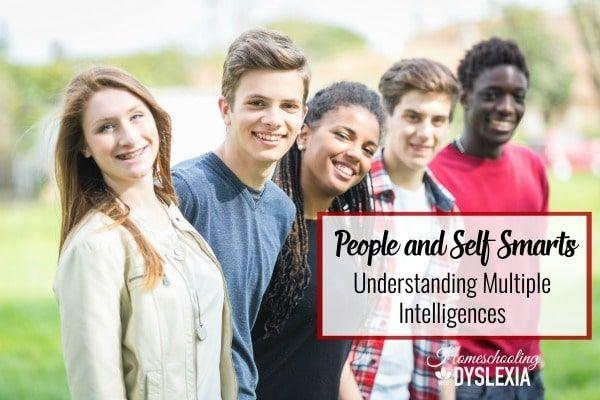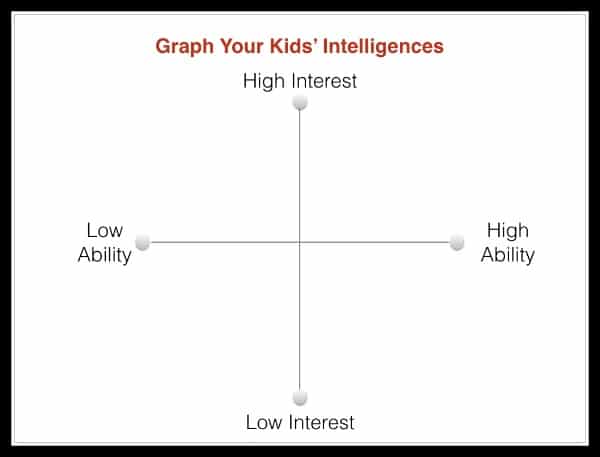
Welcome to the 5th and final post in the Understanding Multiple Intelligences 5-day series! Read the whole series from the beginning here.
In the first post of the series, we talked about what the theory of Multiple Intelligencesis and how it can transform the way you and your kids look at intelligence. Next, we looked at two of the intelligences (or smarts) that are associated with strong academic performance: Word and Logic Smarts. Then we looked at what I call the Artistic Smarts: Picture and Music Intelligences. The 4th post was on the Street Smarts: Nature and Body Smart Kids. Today we’ll look at the People Smarts: People and Self Intelligences.
As you read through the signs and struggles associated with each strength, mark where you think your kids fall on a simple graph like the one below.

People Smart Kids
People who are people smart are interested in… people. They tend to make friends easily partly because they understand people so well. They are also good at reading body language. They think and process their thoughts better by bouncing ideas off of others. Connection is their strength.
People Smart Signs
- Like to watch people
- Make friends easily
- Offered to help when needed
- Feel confident when meeting new people
- Can easily guess how people feel just by looking at them
- Enjoy getting people to see things their way
- Enjoy group activities and lively conversations
- Help the people around them get along better
- Like to organize activities for their friends
- Know how to get people involved
- Preferred to work with others rather than alone
- Are concerned with issues of fairness and right and wrong
People smart kids learn well from mentors. I made the mistake a while back of having my incredibly people smart son doing most of his school on the computer. As the oldest of the 6 kids I was currently homeschooling, it seemed logical. Boy, was that kid miserable! I wish I had known about Multiple Intelligence Theory when he kept asking me if I could teach him.
People Smart Struggles
- Can be great motivators but also great manipulators
- Can be prideful about how many friends they have
- Can become prideful of their ability to manipulate
- May struggle learning on their own
People Smart Careers
People smart people are happiest when they get to interact with people. They may be drawn to service jobs because they can often discern peoples’ needs. One of my dear friends is always thinking of ways to bless our family. When I travel to speak about homeschooling kids with learning differences, she often brings food or offers to watch our kids for a few days while I’m gone. People smart people make the best of friends.
- Public speaker
- Counselor
- Politician
- Lawyer
- Social worker
- Receptionist
- Travel agent
- Advertising
- Personnel director
- Sales person
- Consultant
- Nurse
- Police officer
- Missionary
- Inventor
Self Smart Kids
My Self Smart kid is my easiest kid. Give her some constructive criticism and she takes it to heart by her very nature. Self Smart people think deeply inside of themselves. They can appear to be slow thinkers and they like to think a lot before speaking. They are very reflective. When they’re excited, they may like to go off on their own and think. Many Self Smart kids enjoy reflecting on their past, analyzing the present, and predicting their future. They tend to be effective goal setters.
Self Smart Signs
- Prefer to work alone rather than with others
- Stand up for beliefs even if unpopular
- No their own feelings well
- Enjoy keeping a journal
- Have a good sense of who they are
- Like to set and meet their goals
- Worry less about what other people think of them than others
- Spend time thinking about things that deep the matter to them
- Have a strong sense of what they’re good at
- Think about the future and what they’d like to be one day
Self Smart Struggles
- Their independence and comfort with being alone can lead to self-centeredness
- They may be prideful of their own ideas
- They can believe that their ideas are more important than anyone else’s
- They can have trouble being open to others’ ideas
- Can become unteachable
- Can have high standards that result in being hard on themselves
- Being alone can lead to hopelessness or fear
Self Smart Careers
- Often self-employed
- Entrepreneurs
- Private investigators
- Poets
- Writers
- Pastors
- Counselors
- Social workers
- Teachers
- Therapists
- Guidance counselor
- Personal trainer
Key Takeaways on Multiple Intelligences
Everyone has all 8 intelligences but 2-3 primary strengths.
Every job will consist of responsibilities that touch on several intelligences.
Create relevant experiences for your children to develop and nurture their strengths.
Know that not all experiences will develop into a ‘smart but all experiences will stretch and grow any strength.
Don’t be hyper-focused on high paying jobs. Look for where your kids interests and abilities intersect – this is often where their calling or vocation lies.
Resources for Learning More About Multiple Intelligences
Multiple
Intelligences: New Horizons in Theory and Practice by Howard Gardner
The first decade of research on MI theory and practice was reported in the 1993 edition of Multiple Intelligences. This new edition covers all developments since then and stands as the most thorough and up-to-date account of MI available anywhere. Completely revised throughout, it features new material on global applications and on MI in the workplace, an assessment of MI practice in the current conservative educational climate, new evidence about brain functioning, and much more.
You’re Smarter Thank You Think: A Kid’s Guide to Multiple Intelligence by Thomas Armstrong
Written directly to kids, this is a fascinating read. As kids read the book, they stop asking “How smart am I?” and start asking “How am I smart?” This powerful learning tool is recommended for all kids—and all adults committed to helping young people do and be their best. Resources describe related books, software, games, and organizations. This revised and updated edition includes information on a newly researched ninth intelligence, Life Smart—thinking about and asking questions about life, the universe, and spirituality.

Dr. Kathy Koch loves seeing children flourish and helping parents make it happen—and it’s never too late to start. Now is the time to help your child be all that God designed him or her to be.Accept and affirm your child’s unique smarts.
Motivate your child to learn and study with all 8 smarts
Reawaken any “paralyzed” smarts
Redirect misbehavior in new, constructive ways
Guide your child spiritually, relationally, and to a good career fit
How Understanding Mulitple Intelligences Has Helped my Family
When I began to look at my kids who are ‘outside-the-box’ learners through the lens of MI theory, I was better able to define what I already knew. My kids who couldn’t read or spell well could do things that I could never do. My kids who couldn’t remember their math facts to save their lives were amazingly intelligent in other areas – areas that had value.
I hope that this series on Muiltiple Intelligences has helped you in this same way.
How has learning about the theory of Multiple Intelligences changed the way you look at your own kids’ intelligence?







0 Comments